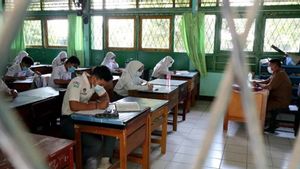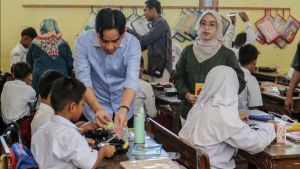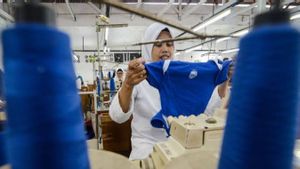JAKARTA As one of the countries with the largest number of children in the world, Indonesia targets to become a developed, modern, and equal country with superpowers in 2045 aka when this country celebrates 100 years of independence. Can Indonesia take advantage of the demographic bonus and present a superior generation in Indonesia Gold 2045?
There is still about two decades left to celebrate the 100th independence anniversary of the Republic of Indonesia. It takes very thorough preparation to realize Indonesia's dream of becoming a developed country.
Indonesian children today are the future of the nation. Indonesian children are now expected to bring Indonesia far more advanced than it is now.
However, Indonesian children will not be a potential resource if there is neglect in the first 1,000 days of life or what is often called the golden age. The first thousand days of human life are periods that greatly affect a person's life in the future.
"In the first 1,000 days are important times, disturbances at this time will have a significant impact on the period of life," said Ahmad Suryawan, Member of the Development Development Work Unit for the Indonesian Pediatrician Association of Pediatricians (IDAI) who is usually called Wawan.
Under Law Number 23 of 2002 concerning Child Protection, which includes a child who is not yet 18 (eightteen) years old, and is among those who are still in the womb.
Children with the current age range 0-18 years, also known as the alpha generation, are the nation's successor candidates. It takes children who are smart and behave well to produce quality leaders as well.
According to data from the United Nations Children's Fund or UNICEF, a third of Indonesia's population is children. This number is equivalent to 80 million children and this makes Indonesia the country with the fourth largest number of children in the world.
The number of children spread across West Java (18.8 percent), East Java (12.8 percent), Central Java (12.7 percent), North Sumatra (6.2 percent), Banten (4.6 percent), and other provinces by 46 percent.
"Indonesia has the fourth largest population of children in the world, so we have big enough homework to help the government," said Wawan.
One of the efforts that can be done to produce quality human resources in welcoming Indonesia Gold 2045 is to pay attention to nutritional intake in the first 1000 days of life, which starts from pregnancy to age of two.
"At the age of two, brain development reaches 80 percent. In that context, what is very necessary for children's brain development is quality early nutrition and early stimulation," said Wawan in an online discussion entitled Building a Healthy Generation of Indonesian Children towards Golden Indonesia, Thursday (25/7/2024).
With such a large number of children and expected to become a superior generation, Indonesia is faced with a number of challenges. Starting from poverty and inequality in children, adolescent and child health, to nutritional problems.
Quality nutrition is a determinant of the survival, health, and growth of children. Children who are nutritious can both grow and learn, participate and benefit the community.
In addition, with quality nutrition, children are also able to survive when facing challenges from diseases, natural disasters, and other forms of the global crisis. Children's nutrition is Indonesia's priority and part of the government's commitment to tackling nutritional problems such as low birth weight and stunting.
Malnutrition in children is a significant problem in Indonesia. Three nutritional currencies problems that affect children aged under five are stunting, low weight andwasting or very thin children.
SEE ALSO:
Although Indonesia's prevalence of stunting continues to show improvement, there are still important works that need to be carried out.
Stunting is a reflection of chronic malnutrition and can lead to long-term barriers, including growth barriers, decreased cognitive and mental abilities, susceptibility to disease, to low economic productivity.
Meanwhile, waste is the lack of acute nutrition and the high frequency of illness in children. This condition increases the risk of child mortality significantly.
Stunting and mortality occur because children do not get proper nutrition or match all stages of their lives. This condition can have significant implications for the health and survival of children in the long term, as well as Indonesia's economic productivity and the nation's ability to achieve national and international development targets.
Indonesia Gold 2045 will not be achieved without investment in children's welfare, especially alleviating a number of nutritional problems with long-term impacts.
Indonesian children still face many challenges, but by protecting children from challenges, it is hoped that this replacement generation will bring a much more advanced country than it is now.
The English, Chinese, Japanese, Arabic, and French versions are automatically generated by the AI. So there may still be inaccuracies in translating, please always see Indonesian as our main language. (system supported by DigitalSiber.id)













